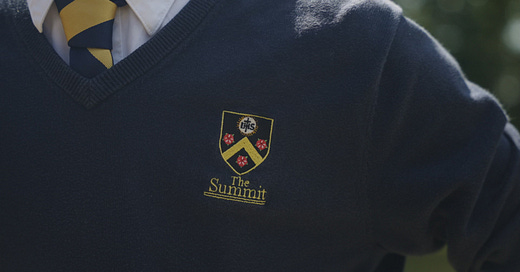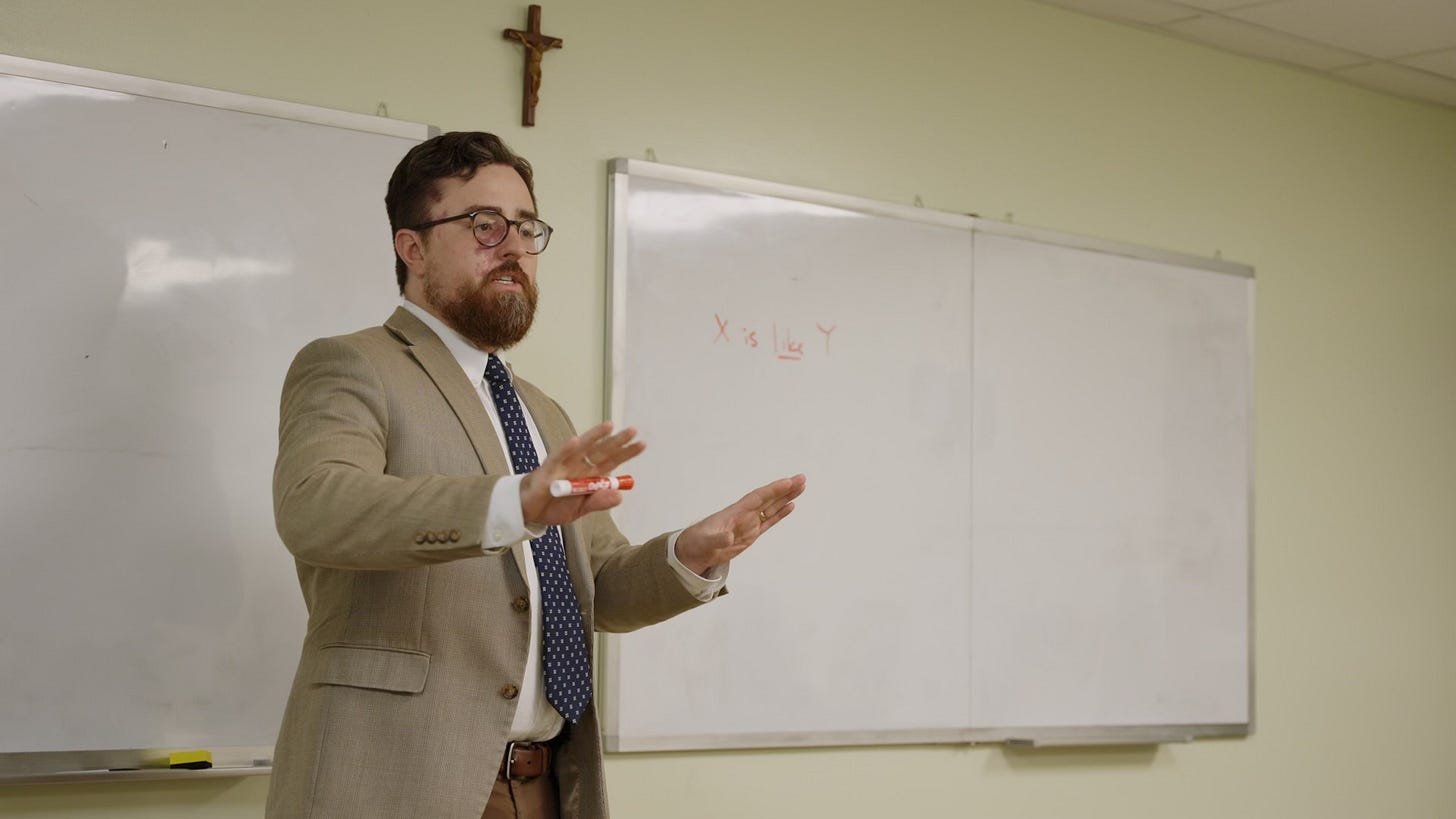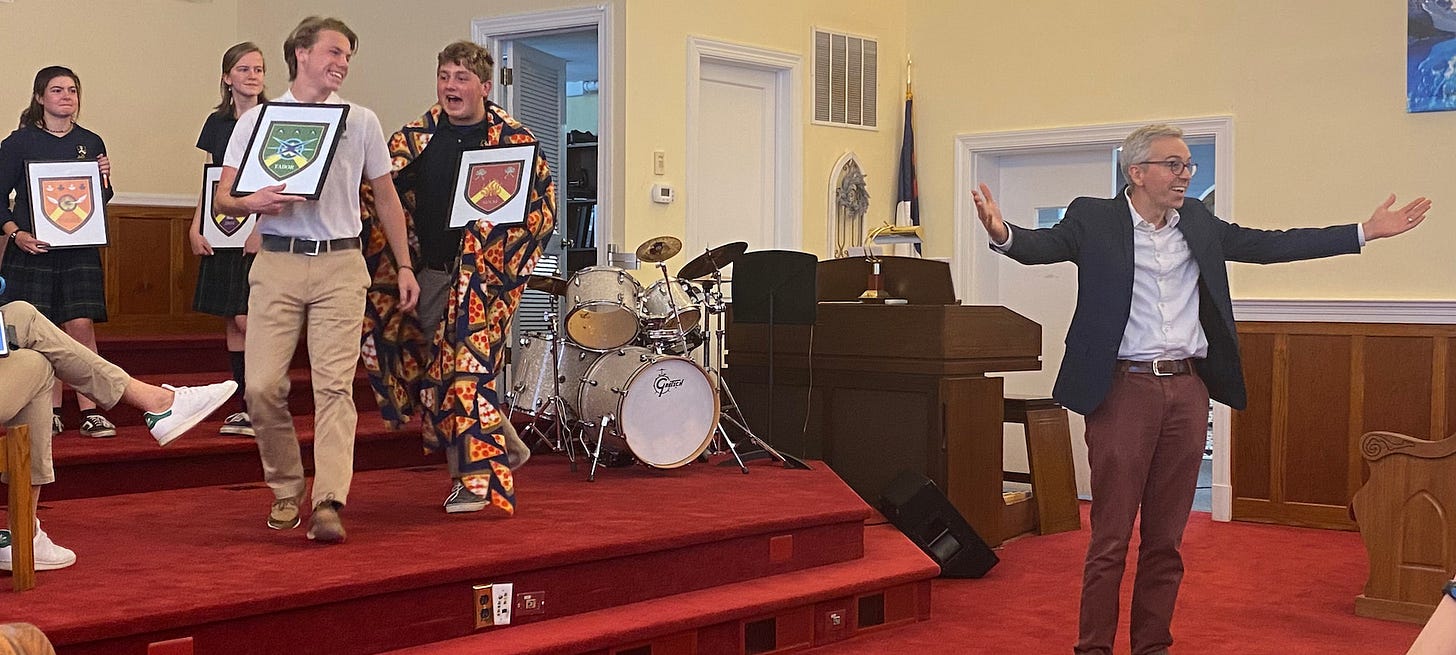Post I: Introduction to The Summit
A new publication to share the life of a classical Catholic school
For those excited about a brighter future for America, look no further than the classical-education movement. This movement is educating young men and women in what it means to be human, how to live freely, and how to live well.
The Summit Academy is part of this movement. Founded in 2016 in historic Fredericksburg, and rooted in the Catholic tradition, The Summit exists to partner with parents by assisting with their vocational calling to form their sons and daughters in Christian virtue so that they become mature, responsible young adults who are equipped to engage the world. This mission informs, guides, and drives everything we do.
The school began with a modest 16 students from a handful of families. It has grown to now 112 students across grades six through twelve from 78 families. We are enjoying great success in terms of traditional metrics — high test scores, good college scholarships, significant financial aid. Yet these metrics cannot tell the whole story, and they don’t tell the whole story of any school. What we are trying to do is cultivate holiness and form students who want to be saints. That’s nearly impossible to measure, but it is possible to see. We are known by our fruits, and we hope that the fruits of a Summit education are excellence, humility, and joy. When our students and community reflect those qualities, we know we are fulfilling our mission.
We are excited to share this journey with you, welcoming you into the life, challenges, and growth of our school. It is my hope that by reading this newsletter, you will think more clearly about education, be better prepared to support the classical-education movement, and share in the joy that comes from educating children well.
This newsletter will be published regularly and include the sections outlined below.
Administrative review:
Our Board of Directors convened on Saturday, October 21. The Board welcomed four new voting members to bring the total to eight; covered the most important priorities, challenges, and opportunities facing the school in the year ahead and the years to come; and enjoyed fellowship over breakfast, lunch, and dinner.
New members will contribute their love for The Summit and its mission, as well as substantial experience in finance and business, start-up ventures, classical education, and more. In the coming months, the board will make critical decisions about facilities — we are just one class away from reaching capacity in our current space — enrollment, fundraising targets, and more.
Board maturity is hard-won, but a good board is worth more than its weight in gold. Boards that exercise good stewardship, prudence, and judgment — that play to their strengths and are not merely a rubber-stamp for the administration or chief executive — can make all the difference to organizational health and longevity.
We have also been holding weekly administrative meetings on Tuesdays after school. These include the headmaster, director of advancement, dean of student life, director of curriculum, and business manager. They are a great chance to highlight wins, share challenges, and reach consensus on pressing matters in the life of the school: which students need more help and attention, what days are good for open houses, and more.
Faculty insight:
Ordinarily there will be a short write-up from a member of our faculty, but each is working hard this week on quarterly reviews. These reviews are an opportunity to attend to our partnership with parents — the starting point of our mission — so that we can best assist them in the formation of their children. They are also an opportunity to solidify our school culture and highlight our academic offerings and growth.
Quarterly reviews are based on our narrative assessments, which start from the premise that grading via points and letters doesn’t sufficiently address the student and his or her potential for growth. Though they take much more time than letter grades, narrative assessments begin conversations that need to happen and facilitate the growth of even the highest achieving students.
Director of Curriculum & Faculty Evan Williams, himself an instructor of five courses (and a student in his own right, as he works towards a doctoral degree), has been working through each narrative assessment and preparing for the quarterly reviews. Mr. Williams views these reviews as a golden opportunity for students to meet one-on-one with their instructors to further explore the narrative assessments, ask questions, and seek advice about how to grow.
Curriculum highlight:
Just arriving at the school last week was Patrick Clark’s hand-picked Virginia history textbook, a nearly 300-page primary-source book which he compiled and had printed and bound. Before coming to Summit, Mr. Clark served as a National Park Ranger and he maintains a great interest in all things U.S. history. He is sharing that love with his eighth grade history students, who will walk through the history of our state with a textbook of primary sources found nowhere else but The Summit!
Mr. Clark collected the work in under ten days. He provides this project summary:
“I've always loved Virginia history and I've spent most of my teaching career sharing the story of our Commonwealth with young people. I basically wanted an easily accessible collection of the best possible resources covering Virginia history, government, geography, and culture at the secondary school level. I really want students to get into the rich language of the primary sources. From the Early Modern English of the Jamestown settlers, to the lyrical poetry of Edgar Allan Poe, to the American rhetoric of Abraham Lincoln, there's something for everyone.
I think of the Virginiana textbook like a greatest hits album from an Important Band Everyone Respects. You may or may not know much about this Band, but now you have an anthology that covers their most important moments, and you can appreciate the general trajectory of their art. Hopefully this DIY textbook helps get students hooked on Virginia history, and inspires them to explore stories beyond the classroom.”
Co-curricular highlight:
The first House competition of the year was a business-pitch event modeled after the popular show Shark Tank. During the even, each house had to promote a self-defeating product to a panel of judges: Headmaster Julian Malcolm, Dean of Student Life John Piescik, and Director of Advancement Nick Marr. Judges made investment decisions based on presentation quality and participation rates. Products included a self-cooling blanket, an edible tie, and more. House Tabor and House Carmel tied for first place in terms of total investments.
From Zach Candler (pictured above), instructor and director of the House program:
“The house system is a way of creating four smaller student-led communities within the larger Summit Academy community. The idea traces its lineage back to Great Britain in the days of dormitory ‘houses,’ but it has been taken up and successfully implemented in many classical Christian schools as a means of enriching student life and strengthening the community. At the Summit, the house system was started in the 2022-23 academic year, at the request of students and in conversation with the faculty, for the sake of maintaining and enhancing positive aspects of the culture of the school.
The goal of the house system is to assist the mission of the Summit Academy ‘to form students in Christian virtue’ by supporting and encouraging friendship, leadership, and service.
In a nod to both the name of our school and our aspiration to seek the highest level in all we do, the four houses are named after four holy mountains from the Scriptures:
House Carmel
House Sinai
House Tabor
House Zion
Each house is led by selected upperclassmen and advised by a faculty member. Students are initiated into their house during the fall semester of their freshman year.”
What we’re reading:
Online, there’s a great resource for administrators, parents, and prospective classical-school founders called Catholic School Playbook, linked here: https://www.catholicschoolplaybook.com.
Our co-founder Julian Malcolm was interviewed there: https://www.catholicschoolplaybook.com/interview-julian-malcolm
In print, I am re-reading Archbishop Chaput’s Strangers in a Strange Land: Living the Catholic Faith in a Post-Christian World. This is a remarkably helpful, insightful, and hopeful pastoral work and reading it will clarify your understanding of the spiritual roots of today’s conflicts and the starting point of their remedy: the conversion of our own hearts.
Also in print, and relevant for the practical administration of schools, I am reading Peter Drucker’s “Managing the Non-Profit Organization.” This book is essential reading for those leaders who understand that their schools are not only valuable institutions that educate children but also organizations that need attention as organizations. Building and preserving good culture, strong leadership, and clear objectives are not easy but always worthwhile.






